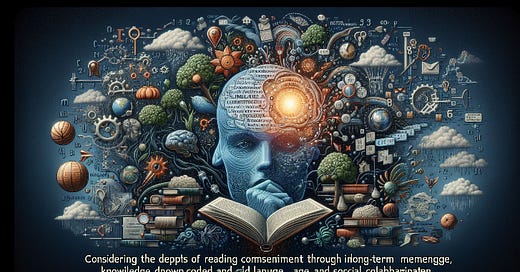Freire’s Pedagogy of the Oppressed took me a year to read. I carried it with me and filled a steno notebook that year in the early 1980s. What I comprehended as a result of reading it changed my perspective on the world. It became a permanent filter and hub in a domain of my long term memory. The notion of hegemony and conscientization was etched in the mantle of my consciousness and figured into not just comprehension of many other texts, but discussions and decisions leading to action.
Discuss a text large or small in your own experience which became much more than message received and processed. Talk about its impact on your reading comprehension thereafter.
*****
The article suggests that our ability to measure reading comprehension has not advanced significantly since the early 20th century. What are some problems and opportunities in quantifying the depth and intensity of comprehension as a foundation of present and future learning, and how might we think about overcoming or maximizing them? Why is it worth the effort?
*****
Considering the depths of comprehension reached through interested and motivated reading experience, as mentioned in the article, how do you think long-term memory, knowledge coded and manipulated in language, and social collaboration contribute to the intensification of reading comprehension?





Love your reference to Freire's Pedagogy of the Oppressed, Terry. I focused on and worked into my teaching the concept of "problem-posing education" against what I saw happening around me: "banking education." Another book that affected me deeply and which I read carefully was The Autobiography of Malcolm X which was recommended by The Experiment in International Living prior to my summer home stay exchange experience with a family in Morocco when I was 21.
Love your take on so many things and our experiences are similar in many ways and we were exposed to the same era -- an exciting time it was.